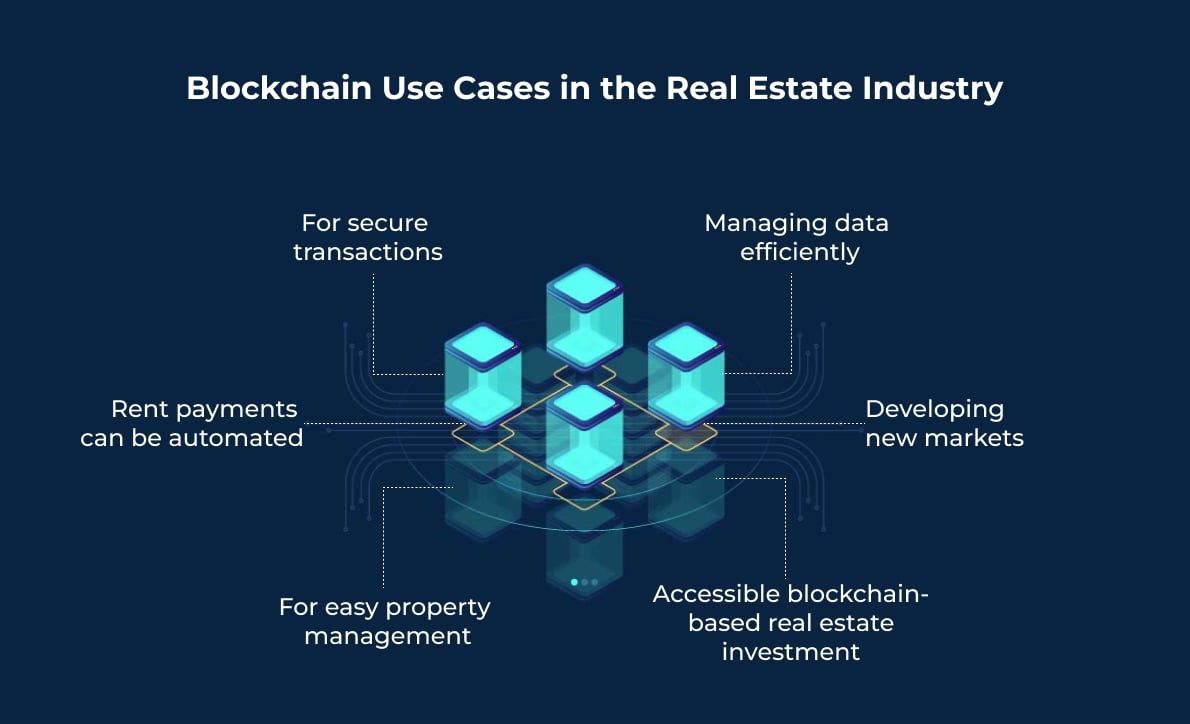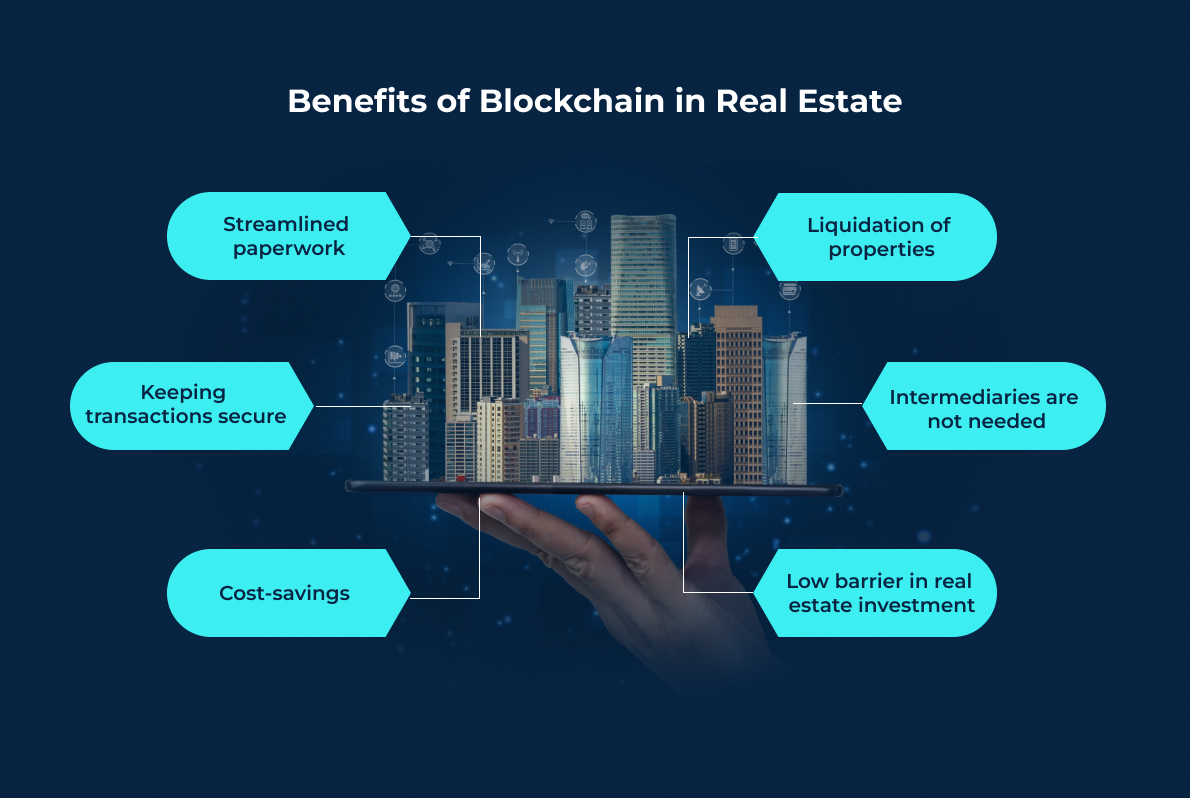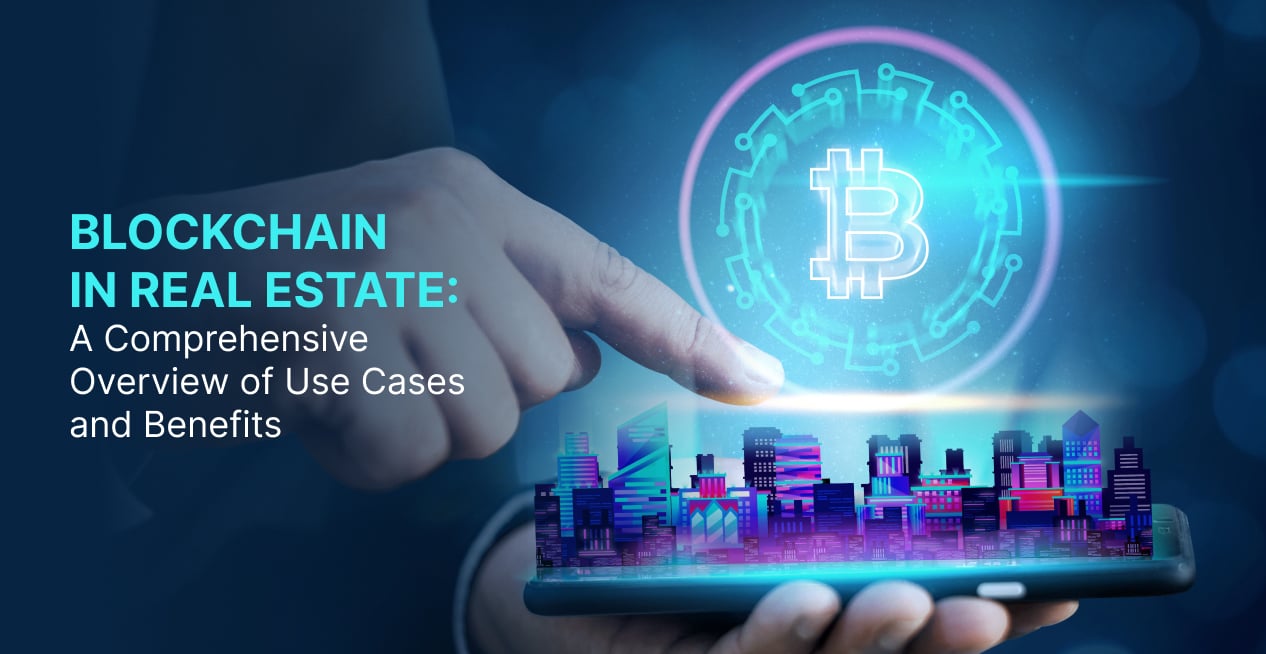-
Introduction to Blockchain in Real Estate
-
What is Blockchain?
-
How is Blockchain Changing Real Estate?
- Blockchain in Real Estate Industry: Use Cases
-
Blockchain in Real Estate: Live examples
- Benefits of Blockchain in Real Estate
-
The Future of Blockchain in the Real Estate Industry
-
Transform Your Real Estate Business with OpenXcell
Introduction to Blockchain in Real Estate
Blockchains are most familiar because of cryptocurrency. Digital coins are not the only potential use of blockchain. The real estate industry is one of the most highly anticipated uses of blockchain. Historically, the real estate industry has been slow to adopt new technologies, but this is not due to a lack of desire to improve. It is predicted that the global tokenization market will reach $4.8 billion by 2025, and blockchain solutions can help a lot in the property business. In this article, we will explore the use of blockchain in real estate and how it can benefit the industry. But first, let’s understand what blockchain technology is.
What is Blockchain?
A blockchain is a distributed database that is shared by the nodes of a computer network. They are widely known for their important role in cryptocurrency systems, which require them to maintain secure and decentralized records of transactions. However, they are not only used in cryptocurrency systems. Any industry can make data immutable using blockchains – the term used to describe the inability to change data.
How is Blockchain Changing Real Estate?
Real estate transactions are increasingly using blockchain technology as its advantages become more widely understood. Using blockchain technology, assets can be recorded and transferred securely, and decentralized. This technology has the capability to revolutionize the real estate industry. Blockchain could change the future of real estate transactions in many ways.
In the first place, it would make the process of buying and selling properties much more efficient and convenient. Smart contracts could also automate many tasks involved in a real estate transaction, including title searches and escrow services. The blockchain also offers a more secure method of recording property ownership. There are often frauds and errors associated with traditional methods of registering property ownership. This information can be stored on a blockchain in a tamper-proof manner. Scams and fraud related to property could be reduced by using this method.
Real estate transactions could be greatly simplified and streamlined with the use of blockchain technology. Fraud may also be reduced as a result of it. Having said that, let’s get more in-depth about how blockchain can improve the real estate industry.
Blockchain in Real Estate Industry: Use Cases

1. For secure transactions
The use of blockchain in real estate gives more control over transactions and reduces fraud risk. When you buy, sell, or rent a property, you are usually dealing with an unknown person. It creates doubt in the realtor’s mind about whether they can be trusted. However, blockchain eliminates all worries. Blockchain-based smart contracts automate financing and payment, giving end users more control.
2. Rent payments can be automated
The blockchain allows the signing and payment of real estate lease agreements, eliminating the need for manual reconciliations and rent/dividend payments. Using data from Internet of Things (IoT) devices and utility bills, you could calculate and charge rent automatically. The automation of different types of payments by real estate platforms encourages good behavior among residents, service providers, and owners.
3. For easy property management
Blockchain technology can be used efficiently in the real estate industry to manage manual paperwork. Blockchain technology can eliminate or upgrade obsolete real estate processes. A major use case of blockchain for real estate is smart contract-based software applications. As a result, these applications help the sector reduce the time and money spent on various processes by automating them.
4. Managing data efficiently
Data is stored within a blockchain using a distributed ledger. Information cannot be altered or deleted once it is entered into the system, and it will remain there for as long as the network continues to operate. A blockchain-based real estate ecosystem ensures that all information related to a property can be accessed by future buyers or investors, creating a transparent ecosystem for everyone. It helps users to make better-informed decisions and enhance a property’s value by providing verified information.
5. Developing new markets
Another leading blockchain real estate use case is tokenization. By tokenizing real estate, it facilitates secondary market trading and opens up new opportunities. Secondary markets are accessible worldwide, thus bringing investors to own tokenized real estate properties. Conversion of real estate to digital assets allows easy buying or selling in the secondary market.
6. Accessible blockchain-based real estate investment
Real estate has always been an attractive investment. Despite this, most common people did not have access to it. There was a huge entry barrier due to accreditation requirements, lengthy due diligence, and the sheer amount of money you needed to invest. It is possible to make real estate crowdfunding even more accessible by using blockchain technology. The tokenization process converts the property into digital assets representing shares of ownership over commercial and residential properties. Multiple individuals can co-own property and buy or sell tokens without intermediaries. Blockchain records, stores, and verifies tokens. Multiple investors boost a real estate project’s efficiency and speed up its funding. As an added benefit, it allows property developers to vet investors outside the immediate network without having to deal with a lot of paperwork.

Blockchain in Real Estate: Live examples
1.Harbor
A digital platform called Harbor uses blockchain technology to create tokenized securities backed by real-world assets. This platform, which was founded in 2017, ensures that tokenized security follows existing security laws in the regions in which it operates.
2. Brickschain
The Brickschain platform digitizes the main inputs of the construction supply chain through data management. It facilitates the installation of protocol layers for managing building materials and streamlines the development of real estate.
3. Ubitquity
The UBITQUITY blockchain platform is a SaaS (Software-as-a-Service) platform that tracks any property lifecycle. Using the platform, title companies, governments, and value-added resellers can keep a clean record of ownership. In this way, you will be able to leverage the advantages of blockchain, such as a reduction in the time needed for future title searches and an enhanced level of transparency.
Benefits of Blockchain in Real Estate

Streamlined paperwork
The process of renting a property involves many tasks and documents. The use of smart contracts on blockchain can help eliminate paperwork, making all information transparent and error-free.
Keeping transactions secure
It is nearly impossible to alter or forge data stored on blockchains. Buying and selling real estate in a network can be more trustworthy since all nodes verify information independently.
Cost-savings
A blockchain-powered platform can reduce the cost associated with property registration, inspections, loans, and taxes in addition to covering intermediary fees.
Liquidation of properties
The real estate market has traditionally been viewed as a low-liquidity asset. You can turn a property into digital tokens that can be bought and sold easily using blockchain technology.
Intermediaries are not needed
It has always been the case that property deals involve lawyers, bankers, and a plethora of real estate agents. In Deloitte’s Blockchain in Commercial Real Estate, new platforms can handle payments, listings, and legal procedures, removing the need for intermediaries.
Low barrier in real estate investment
A blockchain can be used to support fractional ownership of real estate assets. As a result, you won’t have to find a single investor to build a $10 million office complex. You can finance your project by creating 10 million tokens worth $1 each and allowing people to invest as little as $1 in it.
The Future of Blockchain in the Real Estate Industry
Blockchain applications in the real estate industry are only increasing in number, even though bricks and mortar won’t change. Real estate will see even more use cases evolve over the next five years that will deliver more value and better interactions, including:
- Real estate tokenization is becoming more popular and accessible
- Smart contracts will be used for a wider range of products and services
- The number of on-chain transactions in real estate is on the rise
In real estate applications, blockchain has primarily been used on the Ethereum network. Vitalik Buterin, the network’s founder, claims the technology for broad improvements exists today, but the network has only been completed to 55%.
Real estate blockchain is still in its infancy, but it is definitely moving forward and developing at a rapid rate.
Transform Your Real Estate Business with OpenXcell
Businesses around the globe trust OpenXcell to deliver high-end solutions that leverage blockchain technology and have seen blockchain transformation take place over time. With the help of an expert team, the company has an extensive portfolio of clients who are exploring the world of secure decentralized applications. Give your old real estate processes a revolutionary boost with Blockchain Development Services from OpenXcell.








